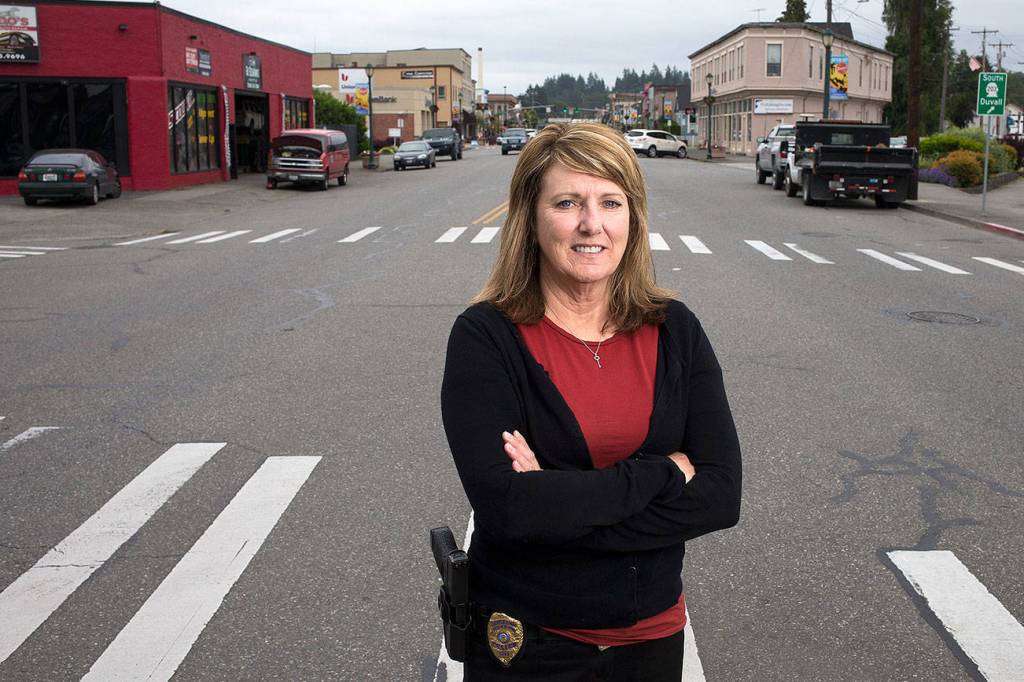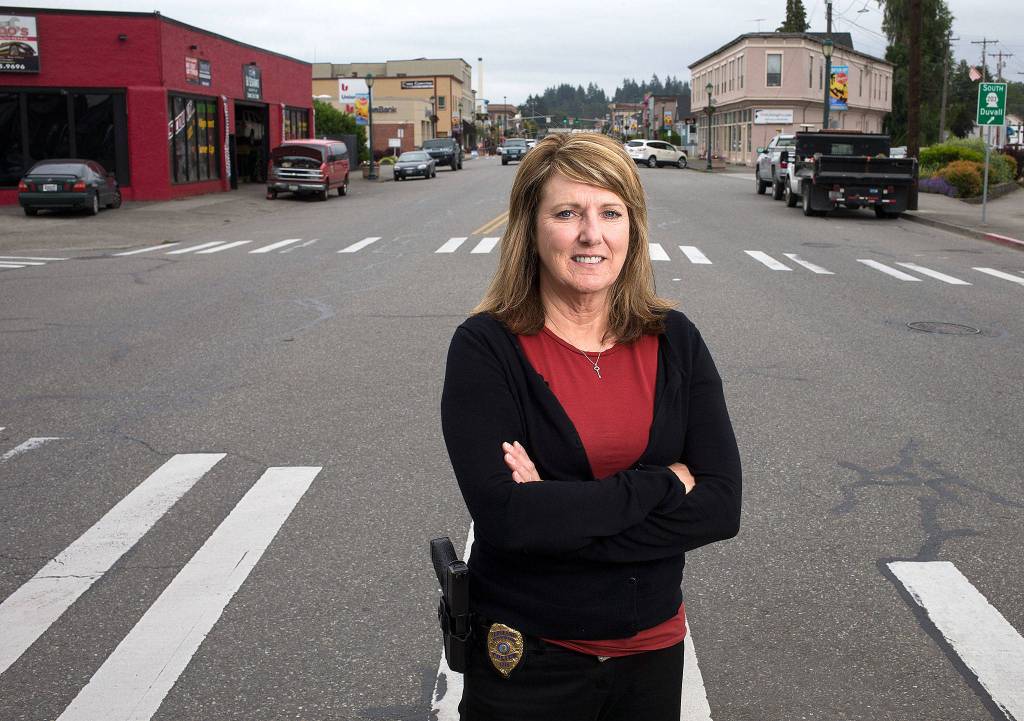Monroe Detective Sgt. Cindy Chessie retires to lead food bank
Published 10:00 pm Thursday, June 29, 2017


MONROE — When there was a major crime to solve, the Monroe Police Department would turn its training center into a war room.
Behind those doors was a study in contrasting methods.
Detective Sgt. Cindy Chessie would hang 2-by-3-foot Post-it notes and jot down critical information with colored highlighters. Photos of victims and suspects, quickly assembled biographies and lists of addresses and phone numbers lined the walls.
Detective Barry Hatch’s first instinct, on the other hand, was to start with a Word document and Excel spreadsheet.
Their brains worked differently but their thoughts were remarkably in sync. When it would come down to strategy — say, approaching the victim or a witness first — their thoughts were always the same.
The way Hatch describes it, his boss wasn’t one who could sit back and watch other people work. They would joke that she was more his partner than his supervisor.
“She was a fabulous detective before she was a supervisor,” Hatch said. “Her investigative mind never quit. That’s why she was such a great partner.”
On Thursday, Hatch lost his partner when Chessie retired. She’d been with Monroe police for 25 years and is the first female officer to retire from the department. She reviewed all felony cases. Her team of detectives had been together for a decade. And she remained on call once a month on weekends.
“A big heart is leaving our department and that is going to be hard to replace,” said Debbie Willis, an administrative director with the police agency.
Chessie, who grew up in the Skykomish Valley, isn’t going far. She’ll be the new executive director of the Sky Valley Food Bank, where she had been a volunteer for nearly five years.
While some detectives prefer anonymity, Chessie asks people how they’re doing when she pushes her shopping cart down the grocery store aisle. She stays in touch with families years after a case has been resolved. She’s been involved in Special Olympics for 20 years and led the Monroe Police Officer’s Association in providing dinners for the homeless, organizing Easter egg hunts and shopping with needy children at Christmas.
She was among the law enforcement officers and athletes to carry the Special Olympics torch in China in 2007. She considers her leg on the Great Wall one of the highlights of her life.
“She always did so much for those people who are most vulnerable — the children, domestic violence victims who couldn’t stand up for themselves, the murder victims, the mentally disabled,” Hatch said.
One of the things Chessie stressed to her detectives was to make contact with the victim or their families first because they are often left in the dark. She wanted her team to go to hospitals and funerals.
Long before she was a detective, Chessie worked 12-hour graveyard shifts, often alone, as a patrol officer. Monroe was a smaller town back then. She would finish her shift, hustle home, make her sons a good breakfast and then check that they brushed their teeth before they headed off to school.
She somewhat stumbled into law enforcement. After high school, she did two stints on a fish processing boat in Alaska. She also worked at her parents’ restaurant, the Dutch Cup, in Sultan. She remembers her dad, Don Newquist, would bring home customers on Christmas Eve if they had nowhere better to go.
She took a job as a part-time clerk with the Sultan Police Department where she used an electric typewriter. There, she was encouraged to become a reserve officer. She eventually became an officer and served in Sultan for just a few months when she was recruited to Monroe. She was in her early 30s at the time.
There was something about the new recruit that appealed to Colleen Wilson, then a Monroe lieutenant.
What Chessie lacked in experience, she made up for in passion and energy.
That’s how Wilson saw it any way. Wilson later became the police chief and made Chessie a detective and promoted her to detective sergeant in 2001.
By then Wilson had seen deeper qualities, the connections Chessie made with abused children and assault victims and how hard she worked on their behalf.
“She cares from her very soul. That’s how she is wired,” said Wilson, who spent 40 years in law enforcement.
Chessie earned respect from outside law enforcement agencies.
When an inmate strangled corrections officer Jayme Biendl at the Washington State Reformatory chapel in 2011, the detective sergeant reached out to the Snohomish County Sheriff’s Office Major Crimes Unit for extra help.
Detectives Dave Bilyeu and Brad Walvatne were assigned to help Hatch and Chessie. The investigation led to a guilty verdict and death sentence for Byron Scherf, a convicted rapist serving a life term. Over the years, Chessie stayed in contact with Biendl’s family and has helped organize an annual memorial run in a tribute to the corrections officer.
“Cindy was more of a leader by example,” Bilyeu said. “They appeared to be partners, but Cindy was in fact the supervisor. Cindy didn’t have the need to have you know she was the supervisor … The community as a whole is a much better place because of Cindy’s work over the years.”
Chessie rattles off a list of memorable cases her unit investigated: convictions in the Biendl case, a whodunit homicide in which a key piece of evidence was a bottle of Frank’s Red Hot hot sauce and a bank robber who used an inner tube as a means of escape down the river.
“Being a detective is really more about teamwork and being open to other people’s opinions,” she said.
Chessie worked on many child abuse investigations, including one of Snohomish County’s early homicide-by-abuse cases in 1998. The suspect, a daycare owner, eventually pleaded guilty to killing Charlotte Wetzel who was just 16 months old.
There also are the unsolved cases that she still thinks about. Seventeen years after her remains were found in a swamp east of town, information seeking tips about the disappearance of Cynthia Rearden can be found on a bulletin board in the lobby of the Monroe Police Department.
Rearden last was seen in city limits in June 1999. Chessie knew her son and her stepdad.
Hatch always admired Chessie’s close ties to her community, along with her compassion.
“Our little family is getting disrupted,” he said the other day. “We have worked really, really well together for so many years and now we have a huge change.”
On Tuesday night, Monroe Mayor Geoffrey Thomas gave Chessie a key to the city to a long and loud applause.
Monroe Police Chief Tim Quenzer said he will miss the detective sergeant.
When Chessie came into his office to break the news that she was retiring to work at the food bank, he wasn’t surprised she would be keeping busy and doing something to help others.
“… I just thought this was perfect. I wish her absolutely the best.”
Eric Stevick: 425-339-3446; stevick@heraldnet.com.






